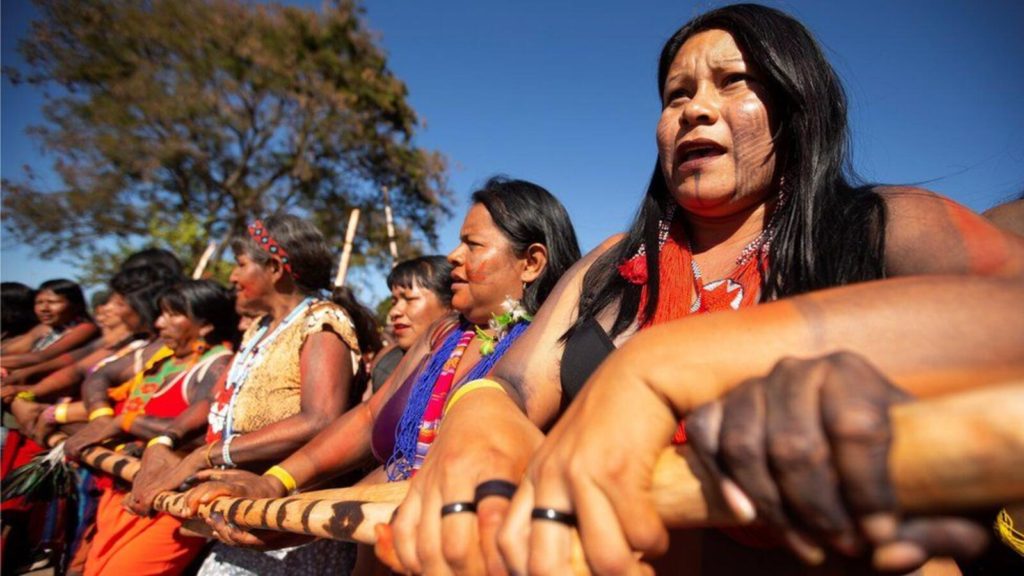
By Nathalie Clarke
Amazonia is the world’s largest tropical rainforest. This 56 million-year-old expanse of forest is home to countless species of life—many of which are still undiscovered. Indigenous Nations have inhabited the land for over 11,000 years and have helped shape the forest as we know it. Capitalist media often depict the Amazon rainforest as a vast, unpopulated expanse of land ripe for the taking. This narrative gives capitalists cover for the rampant deforestation that they’re carrying out to convert the Amazon into farmland, erasing the lives and struggles of its Indigenous People.
Although agribusiness tycoons have been burning the forest for decades, the recent fires in the Amazon dwarf past ones. Since the election of fascist President Jair Bolsonaro, environmental laws have been loosened allowing the big bosses in the mining and farming industries to do what they will. So far in 2019, Brazil’s National Institute for Space Research (INPE) reports an 80 percent increase compared to 2018.
“The [fires are] a direct result of each of Bolsonaro’s incentives to deforestation and his actions to make the environmental code more flexible, allowing the rural capitalists who, incited by the president, make the Amazon burn in flames, increasing their massive estates throughout the region. […] The trail of fire visible from space is a result of the expansion of agribusiness, leaving a trail of the indigenous peoples’ blood, as well as decimating the native fauna and flora” said the Brazilian group Movement of Revolutionary Workers.
These fires occurred just after the Waorani people of Pastaza won a landmark victory: half a million acres of their ancestral lands were to be protected from oil drilling. TWO WEEKS LATER we see a drastic increase in fires set to the Amazon by greedy agri-capitalists, backed by their fascist right-wing government. This is no coincidence; it’s colonization and genocide.
The fascist Bolsonaro told reporters in 1998: “It’s a shame that the Brazilian cavalry hasn’t been as efficient as the Americans, who exterminated the Indians.”
In Brazil, in Honduras, in Louisiana, and around the world, Indigenous people have led the fight to save the planet—risking their safety and lives. A recent Global Witness report found that 3 environmental activists are killed every week; with Brazil listed as number four on the list of most dangerous places for them. On July 23rd, an Indigenous leader and organizer, Emyra Wajãpi, was found dead in northeastern Brazil. Two men who were members of Brazil’s landless activist group MST were killed in December 2018 in a rural area in the northeast state of Paraíba. The names and stories of Indigenous leaders who have put their lives on the line are innumerable.
But environmental activists don’t just face challenges from logging and mining companies. The capitalist State itself—the police, the government, the law—often criminalizes them because they know that chaining oneself to a pipeline or blocking the path of loggers stops the flow of capital like no protest alone can.
In 2017, 84 members of U.S. Congress suggested that the Department of Justice should be able to prosecute pipeline saboteurs as domestic terrorists according to definitions in the federal criminal code. Bolsonaro’s racist, violent remarks and the criminalization of environmental activists represent a global trend.
We, the global working-class, must understand our role in saving the planet. We, the derrick hands on oil rigs, the foot soldiers in endless imperialist wars, the servers that watch our bosses waste food every single day, the auto-workers and welders, truck drivers and cooks, must see through the lies these fat cat politicians would have us believe. Our neighborhoods and regions are already polluted with toxic chemicals. Our houses get built on toxic soil. Our food sources get depleted. We are demonized for eating meat or for driving a pick-up while the wealthy are allowed to jet off to Europe every other week.
We are condemned for working in oil and gas even though those are the only jobs available in our communities. How have we gotten even the smallest sliver of the pie?
The Guarani people of central-western Brazil said, “We invite everybody to fight alongside indigenous peoples against the genocidal attack which is currently underway, and which has been reactivated by the current government.” Our only answer to the current environmental crisis is ourselves: whether farmers, pharmacists, or food service workers, we are fighters, survivors, hard-workers, and we are infinitely powerful when united.
